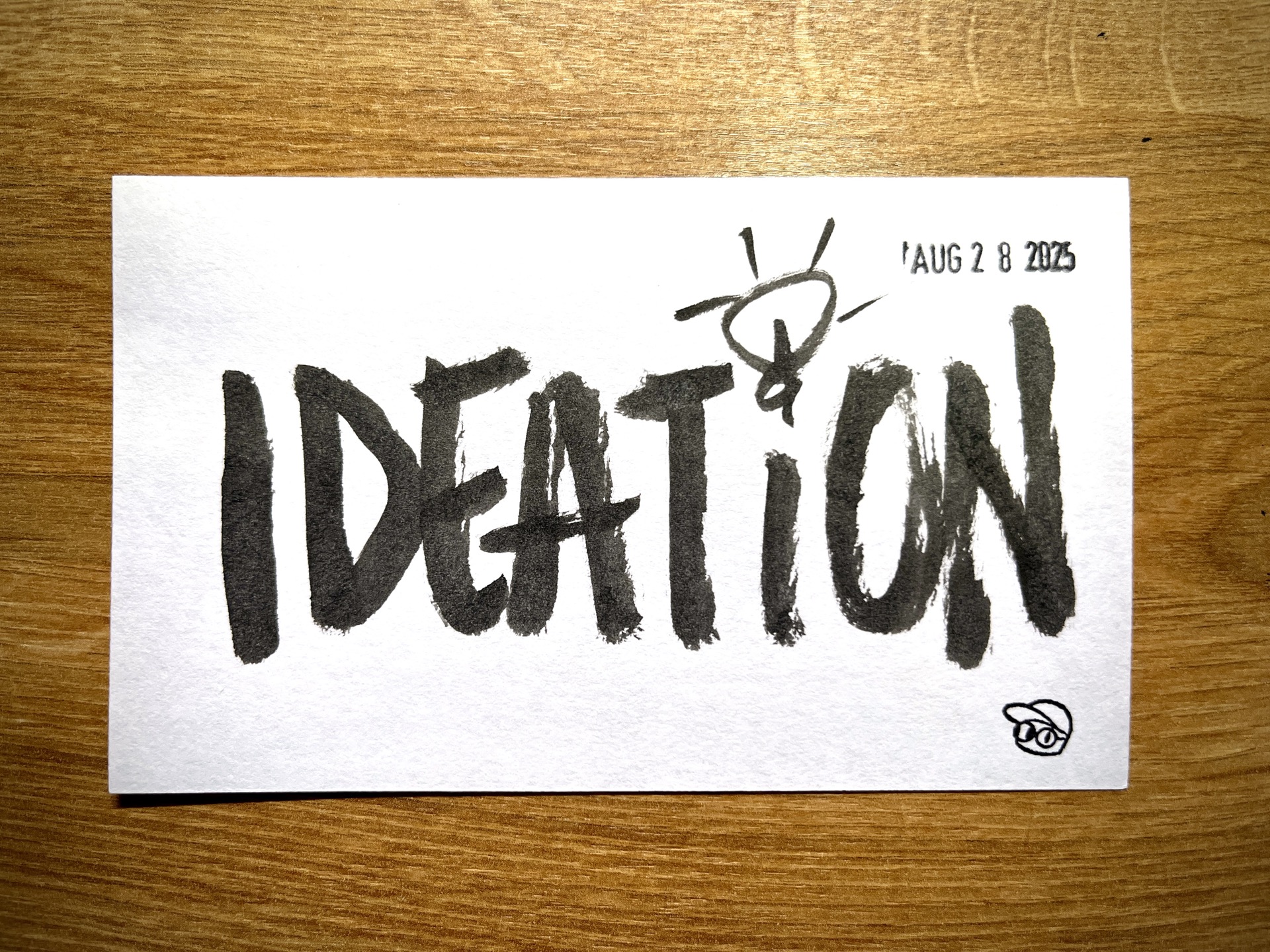All those times someone’s turned to you mid-meeting, mid-crisis, mid-brainstorm and asked: “Any ideas?”
And you freeze. Mouth dry. Brain dust. Your whole body screaming: “Not now. Not like this.”
Then someone else jumps in—smooth, quick, polished. And you shrink. You wonder if maybe you’re not “creative.” Maybe ideas don’t live in you the way they live in them.
I’ve had that feeling too. And every now and then, in conversations with coworkers, we circle back to the same topic: ideation.
“How do you come up with ideas?”
“How do you have so many?”
“How do you do it on the spot?”
“How does it look so natural?”
The truth: it’s not natural. Not for me. Not at all.
If I had to distill it down, it comes to two things: prep and practice.
Prep
I have this relentless habit of writing things down.
A.B.C...D.E.F. Always Be Capturing. Don’t Ever Forget.
Across my scribbles live ideas, snippets, half-sentences, stray metaphors—scattered across the universe of my physical and digital notes.
Sometimes they’re structured: a tidy list or log. Like the day I forced myself to write 47 ideas and tasks in 60 minutes for a single project. A sprint of raw output.
Other times they’re chaos: a random line buried in the middle of a daily log. A fragment with no context, just sitting there, waiting for me to stumble across it again.
To make this possible, I keep my systems “online” at all times. A notebook and pen are always within arms reach. My phone has custom iOS shortcuts on both the lock screen and home screen so I can capture text or voice notes instantly. If neither is available, I’ll scribble an idea across my left hand with whatever pen I can find. And if even that fails, I fall back to my silicone band system—my last-resort memory safety net—just to hang onto the thought long enough to save it later.
Because ideas don’t wait. And if I don’t catch them in the moment, they’re gone.
A.B.C...D.E.F. Always Be Capturing. Don’t Ever Forget.
That’s my prep.
Practice
Every prep is a rep.
Imagine if ideation was a room in your mind. A room you could walk into whenever you wanted.
Most people don’t. They only stumble into it once in a while—out of the blue, usually in a meeting, usually with an audience, always under pressure. Someone throws them the mic: “Any ideas?” And suddenly they’re standing in this dusty, unfamiliar room, blinking, fumbling, trying to remember how to speak. They choke. They panic. They blurt. They leave.
It’s like running into a distant relative at a holiday gathering after years apart. You don’t know what to say. You blurt out an awkward “hi,” and then… silence.
That’s what it feels like to ideate on the spot when you’re rusty. And honestly? That’s the worst time to practice.
So I practice when nobody’s watching.
When was the last time you sat with yourself in silence? No music. No podcast. Just the hum of the fridge, or the faint buzz of traffic outside. No pressure, no audience. Just you asking yourself:
What do I think?
That’s what I do. I visit this room often. Every day. Sometimes just for a quick drop-in. Sometimes I stay awhile.
The Ideation Station. A now familiar place.
Because ideation isn’t about inspiration. It’s about familiarity. You practice until the room isn’t scary anymore. Until silence feels like home. Until the blank page isn’t a monster—it’s just Tuesday.
It doesn’t come naturally to me. Not. At. All.
It feels forced at first. But that’s the point. Like lifting weights, the forcing is the practice. The awkwardness is the rep. And if I don’t put in the work now, I know I won’t be ready when it really matters.
Discipline. Routine. Ritual.
This is my practice.
Perform
So don’t beat yourself up if ideation feels hard—especially on the spot. It probably is. Most likely because you haven’t practiced.
The fix isn’t magic. It’s not waiting for lightning to strike or for “inspiration” to walk in on cue. It’s visiting the room. Over and over. It’s building small rituals. Practicing things like Output Before Input. Getting comfortable with the awkward act of pulling something out of nothing.
Because then, when someone passes you the mic, you’re not panicking. You’re not fumbling for words. You’re not writing a song cold, live, in front of an audience.
You’re singing karaoke. To a track you already hummed last week. To a chorus you’ve mumbled under your breath enough times that it feels familiar. You’ve sung it badly alone in your kitchen. So on stage? You’re not panicking. You’re just singing louder.
To a rhythm you know how to ride because you’ve been here before—at the Ideation Station.
